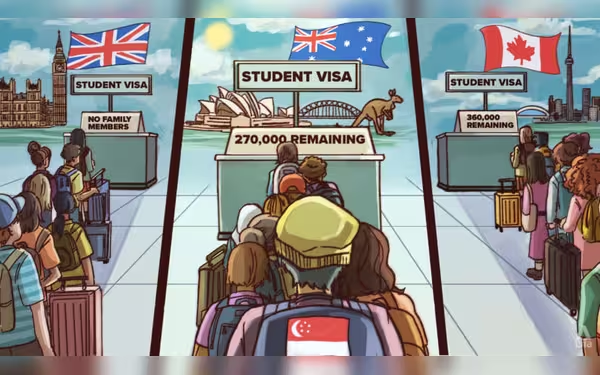Saturday, November 16, 2024 07:38 PM
Student Visa Restrictions Impacting International Education Opportunities
- Countries tightening student visa regulations.
- Potential decline in university enrollment numbers.
- Students must explore alternative study destinations.
 Image Credits: channelnewsasia
Image Credits: channelnewsasiaStudent visa restrictions are reshaping international education, challenging students' dreams of studying abroad.
In recent years, studying abroad has become a dream for many students around the world. The opportunity to experience different cultures, gain quality education, and enhance career prospects has attracted countless individuals to foreign universities. However, this dream is now facing challenges as several countries, including the United Kingdom, Australia, and Canada, have started imposing restrictions on international student visas. These changes are primarily driven by domestic concerns regarding migration levels and the impact of foreign students on local resources.
The sentiment surrounding migration has shifted significantly. Countries that once welcomed international students with open arms are now reconsidering their policies. For instance, the United Kingdom has tightened its visa regulations, making it more difficult for students to secure the necessary documentation to study there. Similarly, Australia and Canada have also introduced measures aimed at controlling the influx of foreign students. This trend raises an important question: will these restrictions dampen the enthusiasm for studying abroad?
For many students, the prospect of studying in a foreign country is not just about education; it is about personal growth and exploration. The chance to meet new people, learn new languages, and immerse oneself in a different culture is invaluable. However, with the tightening of visa regulations, students may find themselves reconsidering their options. The fear of being unable to obtain a visa or facing additional hurdles can deter potential applicants from pursuing their dreams.
Moreover, the impact of these restrictions extends beyond individual students. Universities in countries that impose strict visa regulations may experience a decline in enrollment numbers. This could lead to financial challenges for these institutions, which often rely on international students for funding. As a result, the academic landscape may shift, with some universities losing their competitive edge in attracting global talent.
It is essential for students to stay informed about the changing landscape of international education. While restrictions may seem daunting, there are still numerous opportunities available. Many countries continue to offer favorable conditions for international students, and new destinations are emerging as attractive alternatives. Students should explore all their options and consider countries that prioritize welcoming foreign students.
While the tightening of student visa regulations in various countries may pose challenges, it is crucial for aspiring students to remain resilient and adaptable. The dream of studying abroad is still within reach, and with careful planning and research, students can navigate these changes successfully. Ultimately, the experience of studying in a foreign country can be transformative, and it is worth pursuing despite the hurdles that may arise.













